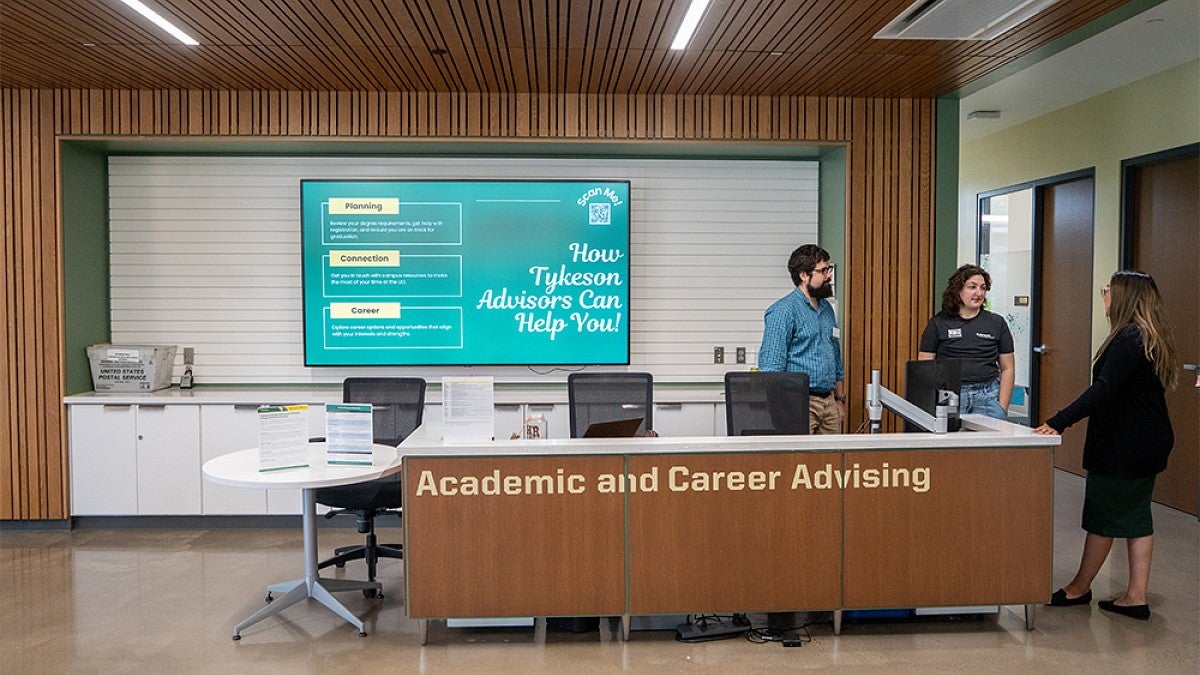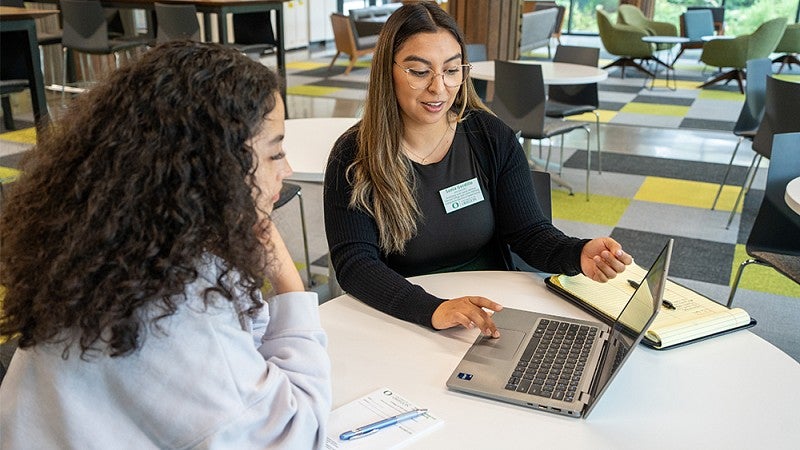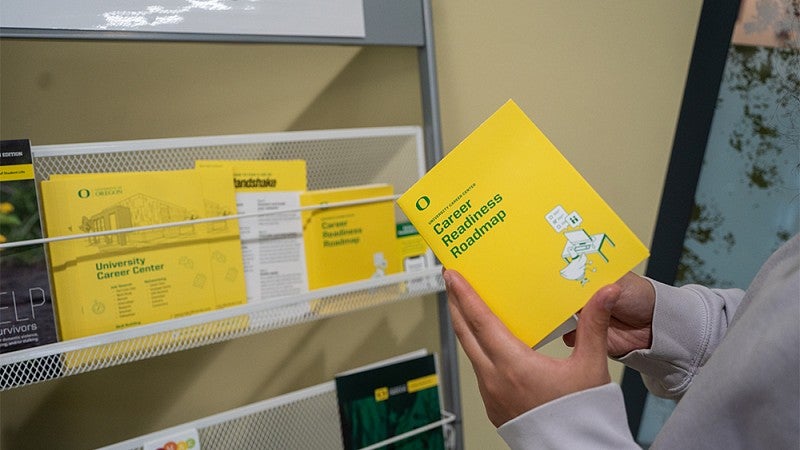
Experiential Learning | Research & Innovation | Community Impact | Career Preparation | Teaching Excellence | 21st Century Liberal Arts | Building Community | Good Vibes | CAS Spotlights | All Stories | Past Issues

September 27, 2024
Meeting Students Where They Are
During winter term of her first year, Lola Sponaas showed up at Tykeson Hall in tears. Her struggles in one of her classes she was enrolled in had driven her to seek help from an academic advisor for the first time.
“My advisor not only talked me down from my crying fit, but they helped me switch into a different class with an instructor they had heard from other students was more explanatory and helpful,” says the political science major and legal studies minor, who is on track to graduate in 2026. “They were right.”
Sponaas’ experience needing guidance is not unique. College is a time of exploration, growth and decision-making, but navigating this path alone can be overwhelming. Students may be in a panic when they book a meeting with an academic advisor, thinking they have to figure things out on their own.
But they don’t need to wait until they reach that point.
In the College of Arts and Sciences (CAS), academic and career advisors play a crucial role in guiding students through the complexities of college, ensuring they succeed academically while thriving personally and professionally. Providing integrated advising that centers the whole student is a key priority in the college's new strategic plan. CAS advisors are available from IntroDUCKtion—UO’s summer orientation program—to graduation, and students are encouraged to build a relationship with an advisor, seeking appointments as needed and at least once per year to update their academic plans.
“In CAS Advising, our priority goals are around providing a supportive student-centered experience,” says Melanie Jones, senior director of CAS Advising. “When students meet with an advisor, one of the things they learn is how to navigate resources across the college and our entire campus. We view advising as a relationship building experience. Over time, with the information advisors share on a host of topics, students will learn more about how to make the most of their experience within CAS and beyond. Related, our team’s collaboration with CAS departments and campus partners are pivotal to our efforts.”
An overhaul of Tykeson Advising’s structure five years ago brought several student resources under one roof to provide students in CAS with the tools for success in a centralized location.
“Shifting to this centralized advising model, in part, was a recognition that not all students have equal resources coming into college and that having advisors available in a timely fashion and in greater numbers could reduce equity gaps by providing students with needed guidance in navigating their college experience,” says Jamie Bufalino, associate dean for undergraduate education in CAS.
Many factors that determine a student’s academic success fall outside the academic experience. They could be financial, related to mental health, or related to their confidence and ability to navigate large university systems.
“Advisors are here to support students and their holistic needs and that includes everything from graduation planning to campus resources to conversations around self-discovery,” says academic and career advisor Callie Treadway. “Students who remain open to exploration in conversations with their advisor tend to discover more exciting, engaging opportunities and realizations about themselves and the world around them than those who are closed to self-reflection.”

Finding the right path
As a first-year student, Gabriella Samaniego visited academic and career advisor Sarah Lambert for help planning her double major in general social sciences and political science.
“Sarah showed me how I can balance my class load with the classes I needed to take and the classes I wanted to take, while still staying on track to graduate,” says Samaniego, who will graduate in 2026. “They always reminded me that there is more to university than my academics and helped me prioritize my own well-being.”
Students are most successful when they look beyond the prescribed classes they need to take and bring bigger questions to their appointments, Lambert says, such as:
- Who am I?
- What do I want my place in the world to be?
- How do I want the world to view me?
Advisors help students explore and reflect on something that's interesting to them and think, "Where might I go from here?"
“I believe students get the most out of advising by being curious about their futures, values and identities,” Treadway says. “Students who remain open to exploration in conversations with their advisor tend to discover more exciting, engaging opportunities and realizations about themselves and the world around them than those who are closed to self-reflection.”
Corey Craig, a UO parent whose son is an environmental studies major, says CAS advisor Ellen Fields helped their student discover a sense of direction and accomplishment he hadn’t felt before.
“He leaves his meetings with her feeling confident that he is on the right track and looking forward to the opportunities ahead that Ellen shares with him on a regular basis,” Craig says. “She has kept my son engaged in the many opportunities that exist in his major and how he can apply what he has learned to potential field experiences.”

Maximizing a liberal arts education
Keeping an open mind to new subjects and career opportunities is essential to the liberal arts experience. CAS’s goal is to prepare students to lead productive lives after college, both in their careers and personal lives. CAS leadership leans heavily into the advantages of a liberal arts degree and wants students and their families to embrace the benefits as well. And CAS offers ample opportunities to build this liberal arts skillset, with more than 50 departments and programs and at least double the possible undergraduate degree options.
Nearly two-thirds of the UO campus population majors in a department housed within CAS. The CAS Advising team has 22 advisors between the school’s three divisions: Humanities, Natural Sciences and Social Sciences. CAS also houses the pre-professional advising area of pre-health and offers pre-law workshops.
Advisors teach students how to shift around their classes, explore electives and make room for the ones that interest them the most. They also help students become more autonomous in their time at UO and more intentional about the courses they select for their core education and electives.
“It is always exciting when students come back identifying minors they would like to pursue after taking a core ed class or an elective course in something they never would have considered studying before,” says pre-health academic and career advisor Sonia Gordillo.
Advisors find that when students explore a broad range of course topics they develop unexpected skills and interests. This can create a pathway to something they ultimately go on to major or minor in. Sometimes it's just a chance to pursue what they’re curious about.
“I talk a lot about the fact that students are designing their brains while in college. It is this organ that you are forever building, which you will have with you for the rest of your life, and it is worth thinking critically about how you train and shape it,” Treadway says.
Advising for both breadth and depth
Academic advisors have a wide breadth of knowledge about many different majors and courses, and they’re skilled at charting a path to graduation while ensuring students explore many opportunities. Once students find the academic path that’s for them, the need for advising expands to include faculty who can provide depth of knowledge in their chosen field of study.
“Faculty advisors are familiar with course content in the major or minor and can help with registration issues, petitions and exceptions related to the major or minor. They are also well-informed about major-specific events and opportunities,” says Nicole Dudukovic, director of the neuroscience major.
“A CAS advisor is a better resource to discuss requirements and opportunities that are outside of the major and to explore career options and professional school programs,” Dudukovic adds. “Because CAS advisors are familiar more broadly with what is going on in CAS and not just one specific major, they are also aware of additional resources and events that are useful to students.”
No matter what questions students have, CAS advisors will either have the answer or support them with finding the answer. Success is measured differently for every student, and advisors are there to help students build an individual plan for success.
“It’s our job to figure out how to help students accomplish their goals,” says Megan Weiler, associate director of CAS Advising. “‘No, that won’t work,’ is never where an advisor will start. Instead, you’ll hear excitement, encouragement, and support in creating a plan.”
—By Jenny Brooks, College of Arts and Sciences
Top 5 Tips for Maximizing Academic and Career Advising
CAS advisors partner with students as they navigate the college experience, including choosing classes, faculty and internships. The advisors recommend that students:
- Visit with an advisor at least once per year.
- Plan ahead to avoid the busiest times when possible.
- Be open to exploring courses in a diverse range of studies to discover an unexpected passion or career path.
- Ask about opportunities outside of the classroom, such as student groups, study abroad programs and internships.
- Schedule time with a career readiness coach to decide on a career path, polish up resumes and cover letters, find a job or internship, practice for interviews, and identify and communicate strengths and passions for the next steps and beyond.
Graduating Career Ready in Liberal Arts and Sciences
Building a culture of career readiness into undergraduate education is a key priority for UO's College of Arts and Sciences. For CAS majors, the goal is to create a CAS-centric experience that celebrates the liberal arts and sciences while preparing students for meaningful careers.
“We always have been 100% certain and committed to the idea that a liberal arts education is valuable. We've always given our students the skills that they need to be successful,” says Jamie Bufalino, associate dean for undergraduate education in CAS. “What we—and many other liberal arts universities and colleges—realized is that students weren't necessarily articulating how the specific content they were exploring translated broadly to hundreds of different possible jobs over the course of a person's lifetime.”
In support of this priority, CAS advisors are working to:
- Connect students with career services earlier in their journey.
- Educate students and their families about the return on investment of an education in liberal arts.
- Help students articulate the skills and knowledge that are inherent in a liberal arts education.
- Identify the in-demand skills employers expect and help students develop them.
- Increase students’ access to experiential learning opportunities such as research and internships.
